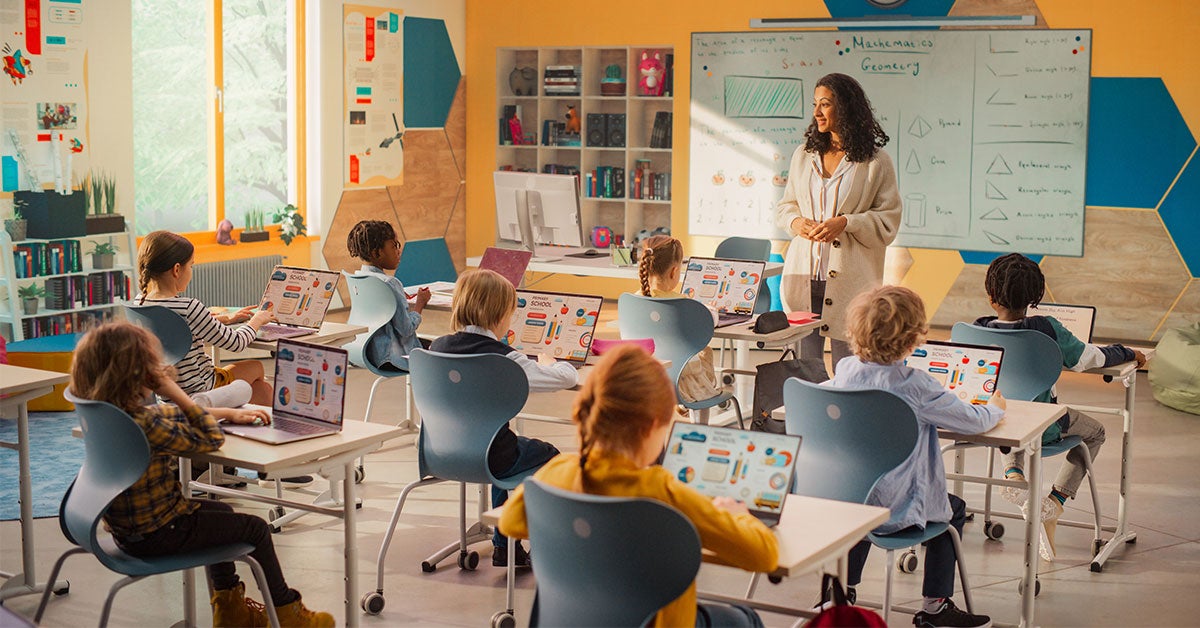How Student-Focused Learning Promotes Equity in Education

Students come from diverse backgrounds, possess unique abilities, and bring different interests into the classroom. An individualized and student-centered approach to educating today’s students empowers diverse learners by recognizing and nurturing their individual strengths, needs, and goals.
With the right background and training, educators can foster learning experiences that address each student as an individual and promote equity in education.
Tailored Learning: Meeting Students Where They Are
Student-focused leaders understand that a standardized approach to education doesn’t account for the many ways students learn and process information. Instead, they create an environment that is adaptable and responsive to the individual learning styles of each student. This approach is particularly beneficial to students from marginalized backgrounds or those with unique learning needs, as it allows them to engage with the material in ways that resonate with them personally.
By tailoring the learning experience to fit the individual, student-focused education can help students grasp concepts more effectively and foster in them a deep love of learning. This personalized approach ensures that all students, regardless of their starting point, have the opportunity to succeed and thrive in their educational journey.
Unleashing Potential: Nurturing Students’ Strengths
Student-focused leaders emphasize identifying and nurturing each student’s strengths. By doing so, they create an environment where students are encouraged to explore their interests and develop their talents.
In a student-focused classroom, students are empowered to take ownership of their learning, set their own goals, and work toward achieving them. When students are seen as individuals with distinct capabilities and aspirations, rather than as a homogeneous group, their confidence grows, and they become more motivated to pursue their passions.
Building Confidence: The Power of Being Heard
Confidence is a critical component of student success and is cultivated in an environment where students feel valued and heard. Student-focused education focuses on creating a supportive and inclusive atmosphere where all students feel safe expressing themselves.
Educators who prioritize student voices and perspectives can help them develop the self-assurance needed to navigate both their educational journey and the world beyond the classroom.
Celebrating Different Perspectives in Education
One of the most profound benefits of student-focused education is its celebration of diverse perspectives. When students are encouraged to share their unique viewpoints, the learning experiences of all students are richer. A student-focused leader actively cultivates an environment where different perspectives are welcomed and seen as essential to a comprehensive education.
Diverse Learners: Embracing Differences for Holistic Growth
In any classroom, students bring a tapestry of experiences, cultures, languages, abilities, and interests. These differences can be a powerful asset when they are recognized and embraced. A student-focused approach to education goes beyond merely acknowledging diversity — it actively leverages this diversity to create more effective and enriching learning experiences for all students.
In a student-focused environment, educators take the time to understand each student’s unique background and needs. This understanding informs the development of their instructional strategies to cater to a wide array of learning preferences.
For instance, a student-focused classroom might adapt curriculum materials to be culturally relevant to certain students, making the materials more accessible and engaging to them. This approach can support students’ academic successes and foster a sense of belonging among all students.
Student Engagement: The Key to Deep and Meaningful Learning
Engagement is the engine that drives students to succeed. Student-focused education prioritizes engagement by creating learning experiences that are relevant, challenging, and meaningful to students. Activities that promote teamwork, problem-solving, and real-world applications of knowledge are particularly effective in maintaining high levels of engagement among students.
A key aspect of fostering students’ engagement is giving them a voice in their education. When students have a say in what and how they learn, they are more invested in the process. This might involve allowing students to choose the topics for their projects, encouraging them to set their own learning goals, or providing opportunities to explore their interests through independent study.
Inclusive Classrooms: Creating Spaces Where Every Student Belongs
Inclusivity in education is about more than just providing equal access to learning materials; it’s about creating an environment where all students, regardless of their background or abilities, can thrive.
In an inclusive classroom, students learn to appreciate and respect one another’s differences, which helps to build empathy and reduce biases. In a globalized society, the ability to understand and respect people from different cultures and backgrounds is crucial. Student-focused education equips students with the tools they need to thrive in a diverse and interconnected world.
The Benefits of Student-Focused Education
The benefits of a student-focused approach extend far beyond individual classrooms. When students feel valued and heard, this often leads them to perform better academically and have a more positive school experience overall. Students are more likely to participate actively in their education when they see its relevance to their lives and interests.
Additionally, a student-focused environment contributes to a positive school climate. It fosters respect, understanding, and collaboration among students, creating a community where everyone feels safe and supported. This is essential for both academic success and personal development.
Finally, student-focused leadership plays a crucial role in promoting equity and social justice in education. By ensuring that all students have access to the resources and support they need to succeed, regardless of their background, student-focused educators help to level the playing field. This commitment to equity works to ensure that every student has the opportunity to reach their full potential.
The Future of Education
As we look to the future, it is clear that student-focused education will play a pivotal role in shaping the leaders, thinkers, and innovators of tomorrow.
By tailoring learning to meet the needs of diverse learners and celebrating different perspectives, student-focused educators are promoting equity in education — creating educational environments that are inclusive, empowering, and transformative. This approach not only benefits individual students but also enriches our communities and society as a whole.
Those who are interested in pursuing an advanced degree to learn more about fostering student engagement in and outside of the classroom may consider an EdD or PhD degree program. Broadly, the EdD is an applied degree focused on preparing educational leaders to solve practical problems in educational settings, while the PhD in Education is a research-focused degree aimed at those who want to contribute new theoretical knowledge to the field and pursue academic or research careers.
The Online EdD in Educational Leadership and Administration program from American International College is a supportive online doctoral degree program designed to prepare professionals for leadership roles where they can facilitate transformative change. The program spans seven semesters (about two years), and the tailored curriculum includes coursework on leadership, student development, and educational policies, with a dissertation integrated throughout.
The Educational Leadership track is suited for students with existing educational licenses who want to transition into leadership or administrative positions in the K-12 space. The program emphasizes diversity, access, and inclusion and covers management topics to help put these values into practice.
Advance your education career today with a degree from American International College.
Sources:
- Association for Supervision and Curriculum Development, “How Leaders Can Support Culturally Responsive Instruction”
- Journal of Education, Humanities and Social Sciences, “The Impact of Student-Centered Learning on Academic Motivation and Achievement: A Comparative Research between Traditional Instruction and Student-Centered Approach”
- National Education Association, Developing a Culturally Responsible Classroom
- Wallace Foundation, School Leadership


